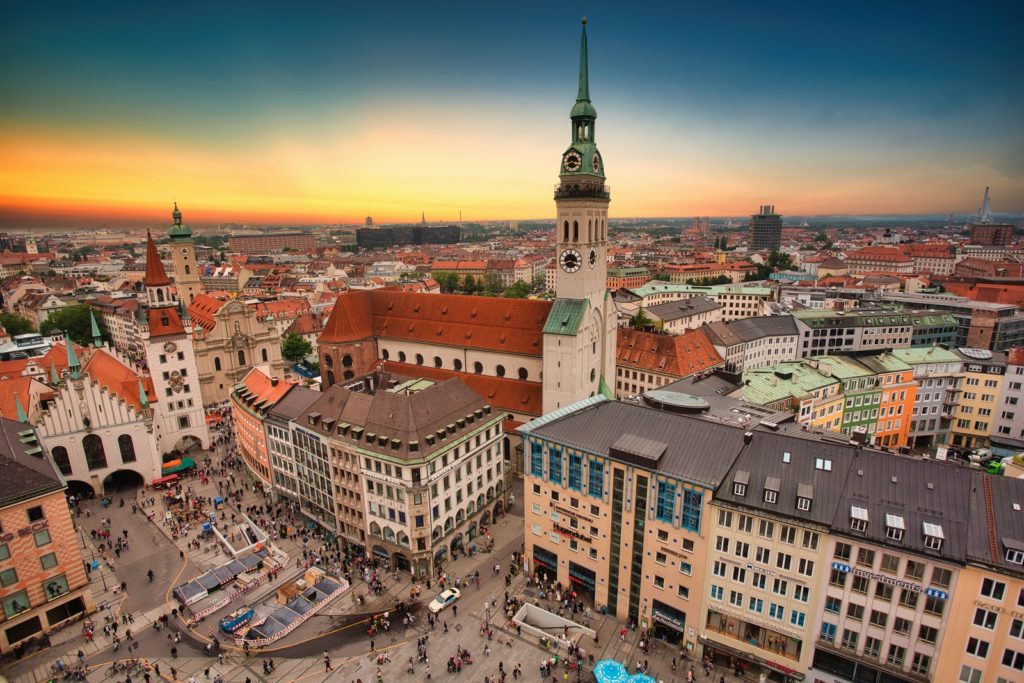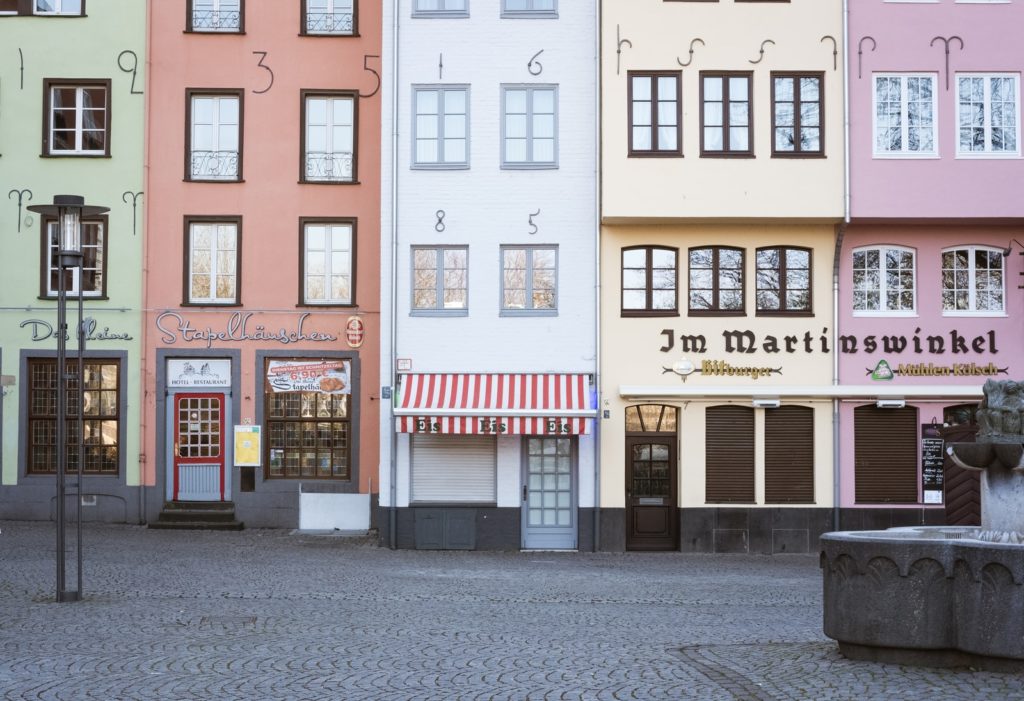What to know while looking for work in Germany
As one of the largest economic powerhouses in Europe and one of the top five economies in the entire world, Germany has long been an attractive destination for those looking to find work. From its traditional engineering and manufacturing industries to its modern boundary-pushing technology sectors, the sixteen federal states of Germany offer a bounty of opportunity.
With such popularity, competition to find a job in Germany is a fierce one. Knowing how to find a job in Germany comes down to your approach and understanding the professional workings of the country. These range from knowing the inner work culture of the Germans, the requirements needed to apply and secure employment to knowing the routes in which to go down. Throughout this guide, we will strive to answer these questions and more, streamlining you on your way to finding a job in the largest country in central Europe.
1- Is it easy to get a job in Germany?
With a huge range of professional opportunities and roles throughout Germany, securing a job isn’t as hard as it may be in other countries around the world. This being the case, the ease of finding a job will fall down to the potential employee being prepared and taking the necessary steps that will put them in good stead. These range from understanding German culture, both professional and personal, brushing up on your German language skills, and being interview ready.
Although the simply worded question of ‘is it easy to get a job in Germany’ is one that can be simply answered in passing, it all depends on the type of work and sector you wish to work in. Germany has a huge range of industries, some more competitive than others. With levels of unemployment far lower in Germany than in many European countries and it has not been affected by a huge skill shortage. This being said, there is a high demand for science, technology, engineering, and maths skill sets, along with a demand for health-based employees in much of southern and eastern Germany.

2- What is Germany’s work culture?
One of the main cultural exports from Germany that much of the world continues to expect is the German work ethic. The work culture in Germany is one that is renowned by many industries, and it is no surprise that this has given the nation an edge when it comes to business and company success.
Productivity is one of the biggest arms of German work culture. Although the fewer German work hours are more in line with liberal and modern approaches, far more work gets done during those hours. This approach to efficiency and productivity in the German work culture has ensured that the German national economy has become one of the largest in the world.
There is a growing balance between this hard-working occupational-based way of living and striking a more modern work-life balance. While in the workplace, there are certain points of etiquette that, although not unique to German work culture, are definitely are a strong component of it.
One of the strongest components of German work culture is the strong hierarchical setup. German business relies on this well-defined and respected hierarchy. There are clearly defined roles and responsibilities, which by working in close respective harmony, get results. Other elements of German work culture revolve around the manners and social interactions of people, especially when you are first introduced to each other. For example, if you are greeting in German, make sure you use the formal version of ‘you’ (Sie) unless invited to use the informal ‘Du’.
These social interactions and etiquettes also transfer to the way German employees communicate with each other. In Germany, the way of speech and communication is ultra direct, something that can often be seen as brash to more English-speaking cultures. This direct, no-frills way of speaking is another reason for the efficacy of a German workforce.
3- What is the minimum wage in Germany?
From July 2022, the minimum wage in Germany will be raised to 10.45 Euros per hour, from the current 9.82 Euros per hour. Any contract or work agreement under this threshold may become invalid. This being said, throughout Germany, many industries and sectors agree on their own set minimum wage based on a collective agreement within that industry.
The German Minimum Wage Act states that employees can make a claim for the difference between the minimum wage and the wage they are being paid. Under this same act, companies may be fined up to €500,000 for not complying with the laws. The lawful minimum wage applies to 18-year-olds and over but under certain conditions, interns may also qualify for the minimum wage. Due to German work laws, the minimum wage is reviewed by the German government twice a year. It is therefore essential to keep updated with new minimum wage legislation.

4- How many hours is a working week in Germany?
Much like elsewhere in the world, the working week in Germany will depend on whether you are working part-time, full-time, or as a student. An average working week in Germany for a full-time employee is between 36 and 40 hours. The days are split between seven and eight hour working days, five days a week. Laws state the limits for these working hours are eight hours per day and 48 hours per week, averaging over six months. Most occupations will set aside 30 minutes’ rest at lunchtime which can be split into two breaks, yet 45 minutes must be given for those employees that work over nine hours a day.
Between the working days, there must be at least 11 hours of rest from the end of one working day to another. Much like the standard minimum wage, some companies and employers will operate a longer working week. This, however, is balanced out with higher wages or far more annual leave holidays. Working on Sundays or public holidays is generally prohibited, though this is not a foregone conclusion. Certain industries such as the service sector may employ staff on Sundays and holidays, but this is generally compensated with time off in the following six or eight weeks.
5- What websites should I use to find a job in Germany?
Like most over the global working world, seeking new employment and jobs in Germany can be done online, streamlining the entire process. The process is made easy by the plethora of websites that are out there, all helping Germans and ex-pats to find a job in the country. These sites are broken down into different sections, all depending on the type of work you are looking for. Whether you are looking for general work in Germany, looking for an internship, a graduate job, or for employment at a start-up, the choice is endless. Let’s take a look at the top websites to use in Germany in which to find a job.
- General Work Websites
If you’re looking to find general work, there are a handful of long-established job-finding companies in Germany that have great websites, and the first of these is StepStone. Stepstone was founded in the mid-90s and allows you to search for a myriad of jobs in Germany. You can cover numerous German towns and cities within your search. This site is the go-to for many job seekers throughout Germany and is inclusive of most professions.
Other more well-known international job-seeking sites are also great places for finding work in Germany, if only by heading straight to their German site. These sites include Monster and Indeed. Although both are US-based companies, these two job-seeking website giants have Germany-based websites, allowing you to find occupations thoroughly based in Germany.
- Websites for Students, Graduates, and Interns
If you are searching for jobs specifically for working students or graduates, or you’re seeking an internship, you may wish to use a website designed specifically for this. The website Absolventa is created with students, graduates, and young professionals. The site will take you straight to these kinds of jobs and will ensure you can filter out roles that will not or do not apply to these categories. By creating an Absolventa profile, companies can easily find you internships or roles that suit your professional roles.
Another website designed specifically for sourcing internships is JobTeaser. A French-based company, JobTeaser has a wide database of jobs from across Europe, including Germany. If you are a student seeking work while studying in Germany, then it’s a great idea to use university portals. Numerous German universities will have a freely accessible job portal that will take you to a forum where local companies can advertise jobs directly to students.
- Websites for Startup Jobs
In a booming era for start-up companies, you may choose to secure yourself a role in a startup. To find such roles, it’s better to go straight to the source and filter out other employees. There are a number of German-based websites that are uniquely curated for those looking for start-up jobs. Gruenderszene is one of the more popular of these sites and allows you to find quick results regarding startup jobs. Other websites specifically designed for finding startup jobs include Angel and Arbeitnow.
- Websites for English-Speaking Jobs
Those looking to find work within Germany but only wish to find English-speaking jobs can search for these jobs on websites such as Englisjobs.de. Here, you are able to search for English-speaking jobs in all sixteen German states by narrowing down the search settings. With English language job posts aimed directly at a foreign English-speaking workforce, you are able to bypass any other job posts that may require you to speak German.

6- Can I find a job in Germany without speaking German?
Finding a job in Germany without speaking German is possible, yet it all depends on the profession in which you are being employed. If you are joining a role with a tech company, start-up, or a digital department, then you are far more likely to find success without having to learn the local German language. Most large German companies will have a digital department and it is these areas where you are most likely to find a job without the ability to speak German.
On the other end of the spectrum, trying to find employment in roles such as human resources, medical professions, accounting, or any other in-depth profession that requires you to deal with German laws, legislation, and technical language.
Although you will find that many Germans are bilingual, especially in the larger cities, having a grasp of the basics of the German language goes a long way when working in most professions. Even having a simple grasp of the German language will allow you to work in more casual roles, as a waiter, cooking, or bar staff. If you are looking to work in the world of German business, you will need to speak German at a B2 language level to be able to work in such an environment.
7- Should my CV/resume be in German?
As you would expect, although you are a non-German and non-German speaking employee, your CV or resume will be read by a German-speaking employer. This being the case, you will need to ensure your application is written in German. There are some expectations for this rule, often if you are applying for an international position, an English-speaking role, or in the world of tech and digital departments.
If you are applying for a job position in Germany, it would be beneficial if your CV/resume is in the German language. You can use a free translation tool but it’s always better to look for a company that provides English to German translation services with certified native translators registered in Justiz Uebersetzer, Germany’s official interpreter and translator database. Having your resume in German would give you a better chance of landing the job position you are applying for.
Whether you’re applying with a German-written CV or an English one, adhering to the German CV/resume structure is essential. Unlike many western countries, especially in the US, CVs and resumes are two different entities. In Germany, the CV and resume is an interactable name and should be treated as such. Keep your resume/CV two pages or less, including concise information about you as a person, education, qualifications, and experience.
8- Can I live and work in Germany as a freelancer?
It is possible to live and work in Germany as a freelancer, but you must ensure you apply through the correct channels and have the correct visa and paperwork. Initially, the first thing you must do is secure yourself a visa for getting into Germany in the first place. The first of these is known as the Freelance Entry Visa.
A Freelance Entry Visa is also known as the National D Visa, which has to be applied for at the German Embassy in the country where you live. This visa is only valid for a few months, but it will ensure you can get past German immigration, and they are aware that you are in Germany to work. Once you are in, you will need to exchange your Freelance Entry Visa for a Freelancer Residence Permit.
The Freelancer Residence Permit is the permit that allows you to stay and work in Germany as a freelancer long-term. To apply for the Freelancer Residence Permit, you will need to visit and apply at the German Immigration Office, known as the Ausländerbehörde. Once you have the residence permit, you will no longer need your entry visa.
There are two different types of Freelancer Residence Permit, the visa for freelance employment, known as the Freiberufler, and the visa for self-employment, known as the Selbständiger. The visa for freelance employment can be obtained by those whose work will have a positive effect on the German only or the promotion of culture within the country. To qualify for the visa for self-employment you will need to be the company founder, the sole proprietor, or the legal representative of the corporation.
Alongside the job descriptions, there are certain criteria you need before you will be granted the Freelancer Residence Permit. To begin with, there must be an economic need or a demand for your profession in the region you settle. You must also provide evidence that there are clients willing to work with you and hire your services – this doesn’t need to be a binding contract but more of a letter providing evidence of interest.
You will also need to prove that you have legal residency in Germany; this includes finding accommodation and registering your address at the local city office, known in Germany as the Bürgeramt. If you are coming to work as a freelancer in Germany and you are over 45, you will also need to provide evidence of a pension plan in place.
Like working as a freelancer in most countries, you will need to arrange and register your tax information before you begin trading. To do this, you will need to register at the German tax office, known as the Finanzamt. Here, you will declare your freelancing activity and they will provide you with a freelance tax number, or in German a Steuer Nummer.

9- What are the requirements to work in Germany?
Before setting off to start a new working life in Germany, you will need to ensure you meet all the requirements to work in the country legally. These range from getting the correct work permit, a health insurance plan, and dealing with the Foreigners Authority.
The first requirement you will need to ensure you have is a German visa. There are two types of German work visas, the Employment Visa and the Job-Seeker Visa. Which one you apply for will all depend on whether you have a prior job offer or not. The Employment Visa will be issued if you already have a job offer from a company based within Germany and you intend on getting a work and residence permit. If you don’t have a job offer from a German company and want to go there to look for a job, you will need to apply for the Job-Seeker Visa. The Job-Seeker Visa is valid for six months. During this half a year, you will need to actively look for work, and once you have secured employment, you are eligible to apply for a work and residence permit.
Those who are non-EU nationals may qualify for something known as a Blue Card or Blaue Karte in German. The Blue Card can be issued in place of a traditional work permit but is only obtainable under certain conditions, all with the purpose of bringing highly educated and economically-increasing professionals into the country.
The first condition is that you must have a higher education degree from either a German university or from a university that is recognized in Germany. Secondly, you must have a certified job offer from a company in Germany – you must submit a work contract during the Blue Card application that proves this offer.
Thirdly, the salary you receive from this job must be one-and-a-half times the national salary average in Germany. This being the case, in 2022, the minimum you should earn to qualify for the Blue Card is €56,400, before tax. However, if your job is in a sector that has a shortage of professionals, such as in science, medicine, engineering, or IT, you can qualify if you earn at least €44,304 before tax.
As part of working in Germany, you will also need to secure yourself a health insurance plan. Once you obtain your work permit, you will be able to qualify for the German statutory health insurance, but to secure your work permit in the first place; you will need insurance. Selecting a private health insurance plan during the application is the best way of meeting this requirement.

Final thoughts on how to find a job in Germany
As we have seen, choosing Germany to find work is a fantastic choice. Germany is a country with a booming economy, strong work ethic, textured work culture, and the system set up to make the change a permanent one. Although it may seem like a web of bureaucracy awaits you, once you know the correct channels to go down and where your own particular situation falls in the system, it soon becomes clear. All of this makes finding a job in Germany a well-oiled process, leaving you to start a whole new working life in the heart of Europe.
How to find rental properties in Germany
- If you’re moving to Berlin, see Berlin apartments
- If you’re moving to Munich, see Munich apartments
- If you’re moving to Cologne, see Cologne apartments
- If you’re moving to Dusseldorf, see Dusseldorf apartments
- If you’re moving to Frankfurt, see Frankfurt apartments
- If you’re moving to Stuttgart, see Stuttgart apartments
- If you’re moving to Heidelberg, see Heidelberg apartments























